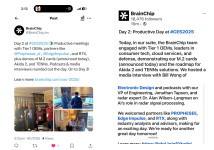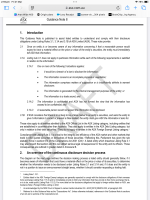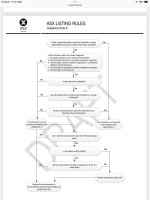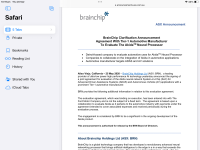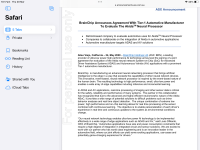And Europe, what if they want purely European companies? India, only Indian companies and so onA random thought just made its way through the fog. What if the redomiciling proposal is because RTX wants a wider defence/aerospace partnership but needs BRN to be a US company?
You are using an out of date browser. It may not display this or other websites correctly.
You should upgrade or use an alternative browser.
You should upgrade or use an alternative browser.
BRN Discussion Ongoing
- Thread starter TechGirl
- Start date
Bravo
Meow Meow 🐾
Neuromorphic computing: the future of AI
Kyle Dickman Science Writer
Neuromorphic computing, the next generation of AI, will be smaller, faster, and more efficient than the human brain.
March 31, 2025Artificial intelligence loves electricity. By one estimate, the cost to power the world’s large language models (LLMs) will surpass the gross domestic product of the United States by 2027. That’s an estimated annual electricity bill of 25 trillion dollars, and while that’s probably an overestimate, the point is: current AI is an energy hog. To counter this, researchers at Los Alamos and across the Department of Energy (DOE) are trying to develop AI that can operate on just 20 watts—the same amount of electricity that powers two LED lightbulbs for 24 hours and roughly the amount of energy consumed by the human brain each day. If successful, the approach is a pathway to AI that’s scalable and mirrors the adaptability of natural intelligence. “We could make a mosquito-sized drone as smart as a mosquito,” says Garrett Kenyon, a computational neurologist at the Lab who specializes in AI. Kenyon calls this still-experimental idea the next generation of AI.
At the core of this AI evolution is neuromorphic computing, a paradigm inspired by the human brain’s structure and function. Unlike current AI models, which rely on binary supercomputers to process billions or even trillions of parameters, neuromorphic systems use energy-efficient electrical and photonic networks modeled after biological neural networks. In Kenyon’s words, these networks use physical hardware to mimic nature’s most efficient and powerful inference and prediction engine. “Human brains can change based on their interpretation of the world,” says Kenyon. “AI, currently, can’t.”
To illustrate this shortcoming of LLMs, one that Kenyon hopes neuromorphic AI can help solve, he references a group of technological pranksters that recently tricked self-driving cars. They flashed the cars with t-shirts emblazoned with STOP signs. The cars, unable to discern context, responded by stopping, demonstrating the deterministic nature of current AI algorithms. The car’s behavior is a product of feed-forward processing. “I see a STOP sign, therefore I stop.” Neuromorphic computers, like biological networks, are designed to process information through feedback loops and context-driven checks. “I see a STOP sign. But that STOP sign is on a t-shirt. I drive on—cheeky kid.”
“The next wave of AI will be a marriage of physics and neuroscience,” says Kenyon. In September, he helped run the DOE’s 2024 Neuromorphic Computing for Science Workshop to prioritize which projects should receive funding through the 2021CHIPS and Science Act, which allocated 280 billion dollars toward, among other things, reestablishing American dominance in computing. At the conference, neuromorphic computing experts from around the country tackled questions such as: Should scientists start by reverse engineering an insect brain or a mouse brain? Which emerging low-energy microprocessors, like the memristors being developed now at the Lab’s Center for Integrated Nanotechnologies, are future systems most likely to use? Can existing supercomputers be used to better model neuromorphic computers before significant resources are committed to building them?

Currently, large neuromorphic computers feature just over a billion neurons connected by a bit more than 100 billion synaptic connections. The human brain has 100 trillion synaptic connections. But Kenyon and his collaborators at institutions including the University of Michigan and Pacific Northwest National Laboratory view these relatively small machines as proof that neuromorphic computing can be scaled to brain-level complexity. “Once we’re able to implement the full process of creating these networks in a commercial foundry, we can scale to very large systems quickly,” says Jeff Shainline, a collaborator of Kenyon’s who works at the National Institute of Standards and Technology. In other words, once you’ve fabricated one neuron, it’s not that much harder to fabricate a million. The scientists’ near-term goal is to build out a design for a neuromorphic computer that sits within a two square meter box and houses as many neurons as the human cerebral cortex. Calculations suggest this computer could operate between 250,000–1,000,000 times faster than a biological brain and use just 10 kilowatts of power, a bit more than a home air conditioning unit.
Kenyon believes this work is laying a path toward an advanced version of neuromorphic AI, one that consumes far less energy than current AI and behaves much more like the intelligence that’s trying to design it.
People also ask
- What is neuromorphic computing? A nascent and promising branch of computing, neuromorphic computing aims to mimic the structure and function of the human brain. Powered by highly efficient artificial synapses and neurons, like the roughly virus-sized memristor circuits developed at the Los Alamos-based Center for Integrated Nanotechnology, a neuromorphic approach could deliver a future where computers consume as much energy as the human brain—and are every bit as powerful.
- How does neuromorphic computing work? Neuromorphic computers are based on the biology of the brain, which in humans is packed with 100 billion neurons. Though the most advanced computers are still just a fraction of the human brain’s complexity, they work in a similar way, with timed electrical signals used to process information in networks of artificial neurons.
DingoBorat
Slim
The sheer size of the US market, outshines any other markets.And Europe, what if they want purely European companies? India, only Indian companies and so on
The fact that we have had these 2 recent US military developmental partnerships, strengthened with ISL and now with Raytheon, with Trump's America First policies, is effing huge!
America has it's own neuromorphic offerings and although obviously not yet commercial, that can easily be changed, especially with a leg up, for a struggling Intel.
But they've said...
"Nope, we need these Aussie guys, AKIDA thing."
The implications of us being chosen, over a home grown solution, for US military "now" should be a huge boost in the confidence of shareholders, for what is to come.
Last edited:
Very very likely.A random thought just made its way through the fog. What if the redomiciling proposal is because RTX wants a wider defence/aerospace partnership but needs BRN to be a US company?
The Orange guy wants US companies first at all costs.
Before, the world was divided into roughly 2 groups regarding military hardware: NATO countries buys mostly F16 and F35's. The iron curtain buys MIG's.
Anyone who can build ships builds them, except submarines that's very specialized, and I saw that you Australians wants US subs!
No doubt, BRN have to move to a US exchange at some point, it's just the biggest market and our IP can be sold all over the world if allowed by the Orange man so China and Russia are maybe out? The Chinese have no respect of IP rights anyway, so if they can reverse engineer Akida I am afraid they will do it, but I read that it will be very difficult?
A US exchange will give the company much more exposure to a much bigger audience, WW.
My post is sort of echoing DingoBorat's I can see.
The subcontractor referred to in the AFRL contract was so obviously going to be Raytheon/RTX…

BrainChip and Raytheon partner on neuromorphic radar signal processing | BrainChip posted on the topic | LinkedIn
BrainChip is proud to announce a collaboration with Raytheon, an RTX business, in support of a U.S. Air Force contract focused on advancing neuromorphic radar signal processing. The contract is titled “Mapping Complex Sensor Signal Processing Algorithms onto Neuromorphic Chips" and focuses on...www.linkedin.com
View attachment 81052

BrainChip Partners with RTX’s Raytheon for AFRL Radar Contract
Raytheon will deliver services and support as a partner with BrainChip for the completion of the contract award. The Air Force Research Labs contractbrainchip.com
BrainChip Partners with RTX’s Raytheon for AFRL Radar Contract
Laguna Hills, Calif. – April 1st, 2025 – BrainChip Holdings Ltd (ASX: BRN, OTCQX: BRCHF, ADR: BCHPY), the world’s first commercial producer of ultra-low power, fully digital, event-based, neuromorphic AI, today announced that it is partnering with Raytheon Company, an RTX (NYSE: RTX) business, to service a contract for $1.8M from the Air Force Research Laboratory on neuromorphic radar signaling processing.
Raytheon Company will deliver services and support as a partner with BrainChip for the completion of the contract award. The Air Force Research Labs contract, under the topic number AF242-D015, is titled “Mapping Complex Sensor Signal Processing Algorithms onto Neuromorphic Chips.” The project focuses on a specific type of radar processing known as micro-Doppler signature analysis, which offers unprecedented activity discrimination capabilities.
Neuromorphic hardware represents a low-power solution for edge devices, consuming significantly less energy than traditional computing hardware for signal processing and artificial intelligence tasks. If successful, this project could embed sophisticated radar processing solutions in power-constrained and thermally constrained weapon systems, such as missiles, drones and drone defense systems.
BrainChip’s Akida™ processor is a revolutionary computing architecture that is designed to process neural networks and machine learning algorithms at ultra-low power consumption, making it ideal for edge computing applications. The company’s neuromorphic technology improves the cognitive communication capabilities on size, weight and power & cost (SWaP-C)-constrained platforms such as military, spacecraft and robotics for commercial and government markets.
“Radar signaling processing will be implemented on ever-smaller mobile platforms, so minimizing system SWaP-C is critical,” said Sean Hehir, CEO of BrainChip. “This improved radar signaling performance per watt for the Air Force Research Laboratory showcases how neuromorphic computing can achieve significant benefits in the most mission-critical use cases.”
About BrainChip Holdings Ltd (ASX: BRN, OTCQX: BRCHF, ADR: BCHPY)
BrainChip is the worldwide leader in Edge AI on-chip processing and learning. The company’s first-to-market, fully digital, event-based AI processor, AkidaTM, uses neuromorphic principles to mimic the human brain, analyzing only essential sensor inputs at the point of acquisition, processing data with unparalleled efficiency, precision, and economy of energy. Akida uniquely enables Edge learning local to the chip, independent of the cloud, dramatically reducing latency while improving privacy and data security. Akida Neural processor IP, which can be integrated into SoCs on any process technology, has shown substantial benefits on today’s workloads and networks, and offers a platform for developers to create, tune and run their models using standard AI workflows like TensorFlow/Keras. In enabling effective Edge compute to be universally deployable across real world applications such as connected cars, consumer electronics, and industrial IoT, BrainChip is proving that on-chip AI, close to the sensor, is the future, for its customers’ products, as well as the planet. Explore the benefits of Essential AI at www.brainchip.com.
Absolutely. Remember the deleted LinkedIn posts that said we were partnered with RTX (then were deleted) by BRN.
Attachments
Realinfo
Regular
Do we all recall hearing at the last AGM…if we win one big deal, it could make us profitable overnight?
It has recently been suggested that ASX disclosure rules could prevent this deal from ever happening…that direct feedback from organisations is that they will not do business with Brainchip because of the ASX disclosure rules...that they do not want to be forced into revealing financial, product use or anything about their relationship with Brainchip, that they wish to remain secret.
I am told that this is the principal reason for listing in the US.
As FF tells us DYOR…well Fact, I have.
If one looks at the ASX disclosure rules, they allow companies to maintain total confidentiality if they follow rule 3.1A (see below). During discussions with the ASX, I have been told…’follow these rules and you don’t have to disclose’.
Now this might exasperate shareholders, myself included, but if a customer wants their relationship with Brainchip kept confidential, it is up to both companies to say nothing.
Ford agreed to make an ASX announcement (see below) so long as it didn’t reveal their name...but because of the speculation surrounding it, the ASX required the name of the Tier-one automotive manufacturer to be released. This upset Ford, and perhaps led to them not continuing with their evaluation.
THIS IS A GOOD EXAMPLE OF AN ANNOUNCEMENT THAT NEVER HAD TO BE MADE.
If Ford didn’t want to be identified, then as keen as Brainchip might have been at the time, the announcement should never have occurred.
The same applies to all organisations Brainchip has or will have an association with…if they demand confidentiality, then ASX rule 3.1A allows it. Customers can be told with absolute certainty…if you demand confidentiality, then we both have to remain mute about our relationship.
The risk of breaking confidentiality is no greater here, than in any other environment.
So this issue cannot be used as a reason for moving. If the above pathway is followed, Brainchip will enhance its credibility, it will win the deals, generate revenue, increase its share price, and be able to move to a US listing without causing a major loss in value to its existing shareholders.
It has recently been suggested that ASX disclosure rules could prevent this deal from ever happening…that direct feedback from organisations is that they will not do business with Brainchip because of the ASX disclosure rules...that they do not want to be forced into revealing financial, product use or anything about their relationship with Brainchip, that they wish to remain secret.
I am told that this is the principal reason for listing in the US.
As FF tells us DYOR…well Fact, I have.
If one looks at the ASX disclosure rules, they allow companies to maintain total confidentiality if they follow rule 3.1A (see below). During discussions with the ASX, I have been told…’follow these rules and you don’t have to disclose’.
Now this might exasperate shareholders, myself included, but if a customer wants their relationship with Brainchip kept confidential, it is up to both companies to say nothing.
Ford agreed to make an ASX announcement (see below) so long as it didn’t reveal their name...but because of the speculation surrounding it, the ASX required the name of the Tier-one automotive manufacturer to be released. This upset Ford, and perhaps led to them not continuing with their evaluation.
THIS IS A GOOD EXAMPLE OF AN ANNOUNCEMENT THAT NEVER HAD TO BE MADE.
If Ford didn’t want to be identified, then as keen as Brainchip might have been at the time, the announcement should never have occurred.
The same applies to all organisations Brainchip has or will have an association with…if they demand confidentiality, then ASX rule 3.1A allows it. Customers can be told with absolute certainty…if you demand confidentiality, then we both have to remain mute about our relationship.
The risk of breaking confidentiality is no greater here, than in any other environment.
So this issue cannot be used as a reason for moving. If the above pathway is followed, Brainchip will enhance its credibility, it will win the deals, generate revenue, increase its share price, and be able to move to a US listing without causing a major loss in value to its existing shareholders.
Attachments
DingoBorat
Slim
I have always hated flow charts!..Do we all recall hearing at the last AGM…if we win one big deal, it could make us profitable overnight?
It has recently been suggested that ASX disclosure rules could prevent this deal from ever happening…that direct feedback from organisations is that they will not do business with Brainchip because of the ASX disclosure rules...that they do not want to be forced into revealing financial, product use or anything about their relationship with Brainchip, that they wish to remain secret.
I am told that this is the principal reason for listing in the US.
As FF tells us DYOR…well Fact, I have.
If one looks at the ASX disclosure rules, they allow companies to maintain total confidentiality if they follow rule 3.1A (see below). During discussions with the ASX, I have been told…’follow these rules and you don’t have to disclose’.
Now this might exasperate shareholders, myself included, but if a customer wants their relationship with Brainchip kept confidential, it is up to both companies to say nothing.
Ford agreed to make an ASX announcement (see below) so long as it didn’t reveal their name...but because of the speculation surrounding it, the ASX required the name of the Tier-one automotive manufacturer to be released. This upset Ford, and perhaps led to them not continuing with their evaluation.
THIS IS A GOOD EXAMPLE OF AN ANNOUNCEMENT THAT NEVER HAD TO BE MADE.
If Ford didn’t want to be identified, then as keen as Brainchip might have been at the time, the announcement should never have occurred.
The same applies to all organisations Brainchip has or will have an association with…if they demand confidentiality, then ASX rule 3.1A allows it. Customers can be told with absolute certainty…if you demand confidentiality, then we both have to remain mute about our relationship.
The risk of breaking confidentiality is no greater here, than in any other environment.
So this issue cannot be used as a reason for moving. If the above pathway is followed, Brainchip will enhance its credibility, it will win the deals, generate revenue, increase its share price, and be able to move to a US listing without causing a major loss in value to its existing shareholders.
But that aside, I'm not sure how what you've posted, would get past the 2nd box, with at least one of the 5 criteria having to be met?..
Last edited:
FiveBucks
Regular
Do we all recall hearing at the last AGM…if we win one big deal, it could make us profitable overnight?
It has recently been suggested that ASX disclosure rules could prevent this deal from ever happening…that direct feedback from organisations is that they will not do business with Brainchip because of the ASX disclosure rules...that they do not want to be forced into revealing financial, product use or anything about their relationship with Brainchip, that they wish to remain secret.
I am told that this is the principal reason for listing in the US.
As FF tells us DYOR…well Fact, I have.
If one looks at the ASX disclosure rules, they allow companies to maintain total confidentiality if they follow rule 3.1A (see below). During discussions with the ASX, I have been told…’follow these rules and you don’t have to disclose’.
Now this might exasperate shareholders, myself included, but if a customer wants their relationship with Brainchip kept confidential, it is up to both companies to say nothing.
Ford agreed to make an ASX announcement (see below) so long as it didn’t reveal their name...but because of the speculation surrounding it, the ASX required the name of the Tier-one automotive manufacturer to be released. This upset Ford, and perhaps led to them not continuing with their evaluation.
THIS IS A GOOD EXAMPLE OF AN ANNOUNCEMENT THAT NEVER HAD TO BE MADE.
If Ford didn’t want to be identified, then as keen as Brainchip might have been at the time, the announcement should never have occurred.
The same applies to all organisations Brainchip has or will have an association with…if they demand confidentiality, then ASX rule 3.1A allows it. Customers can be told with absolute certainty…if you demand confidentiality, then we both have to remain mute about our relationship.
The risk of breaking confidentiality is no greater here, than in any other environment.
So this issue cannot be used as a reason for moving. If the above pathway is followed, Brainchip will enhance its credibility, it will win the deals, generate revenue, increase its share price, and be able to move to a US listing without causing a major loss in value to its existing shareholders.
But where's the money??
DingoBorat
Slim
This is a good point. A dual listing would allow those shareholders who hold shares in self managed super funds to keep hold of their shares rather than being forced to sell at a dismal share price.This is how Sean will sell it to sh. If we are not US listed we won't get any grants etc. We'll look into dual listing's Sean
DingoBorat
Slim
It doesn't do anything about the regulatory requirements, of being listed on the ASX in respect to disclosure though, which is one of the larger issues.This is a good point. A dual listing would allow those shareholders who hold shares in self managed super funds to keep hold of their shares rather than being forced to sell at a dismal share price.
I previously strongly favored a dual listing, but it doesn't work, for that important reason.
Last edited:
supersonic001
Regular
#israeli #technology #founders | Avraham Hermon
In this picture with Ilay Marom, COO of NaNose Medical, we are holding in our hands a machine which can detect common, life-threatening diseases using a quick breath test, performed at a doctor's office. Listen to more about Ilay's journey and incredible, life-saving device, on the latest...
Yes but the biggest issue is for those holding shares in super. Imagine being a loyal supporter of the company and holding shares for years and riding all the ups and downs only to be forced to sell at a loss. The share price will need to be significantly higher before these shareholders can get the return on investment that they deserve.I doesn't do anything about the regulatory requirements, of being listed on the ASX in respect to disclosure though, which is one of the larger issues.
I previously strongly favored a dual listing, but it doesn't work, for that important reason.
HopalongPetrovski
I'm Spartacus!
Partnerships are great. Building the eco system is great. Being in universities is great. Having solid patent protection is great.As expected, even this positive news isn’t moving anything anymore. People just want to see cash. Partnerships don’t interest anyone anymore. And the short sellers have an easy game, as always.
I like and endorse all those things and they make sense to me.
If we were living in the Star Trek universe, they would all probably be sufficient and we could just get on exploring the universe.
But in this one, where small investors back companies with an understanding that they will be compensated for the use of their capital and the risk undertaken, eventually the Company must be able to at least stand on it's own feet and that involves bringing in more revenue than it takes to fund the operation.
We are now well over 3 years into Sean's 5 year plan.
It's time to see us making some progress towards commercial adoption.
ISL and RTX are nice nibbles and will hopefully prove our worth and allow us further traction and adoption within these companies.
I'm also happy for us to be continuing our R&D and expanding our product range, particularly in light of customer feedback.
But the fact remains that Sean was bought onboard to commercialise us and our product and that has been the promise and supposedly the emphasis for at least the last two years.
I'd appreciate some straight talk from Sean about where we are at commercially.
I'm not asking him to predict the future, but an honest disclosure of our progress in relation to his plan thus far, would go some way towards restoring his credibility, which, in my eyes anyway, is wearing thin.
Last edited:
Yep, I just want my money back. I would like to reinvest in other stocks while they are slightly discounted at this moment.As expected, even this positive news isn’t moving anything anymore. People just want to see cash. Partnerships don’t interest anyone anymore. And the short sellers have an easy game, as always.
We have so many partnerships and collaborations, and they have produced nothing so far. So for me these little news don't mean anything anymore.
That’s exactly what I mean. I completely agree with you.Partnerships are great. Building the eco system is great. Being in universities is great. Having solid patent protection is great.
I like and endorse all those things and they make sense to me.
If we were living in the Star Trek universe, they would all probably be sufficient and we could just get on exploring the universe.
But in this one, where small investors back companies with an understanding that they will be compensated for the use of their capital and the risk undertaken, eventually the Company must be able to at least stand on it's own feet and that involves bringing in more revenue than it takes to fund the operation.
We are now well over 3 years into Sean's 5 year plan.
It's time to see us making some progress towards commercial adoption.
ISL and RTX are nice nibbles and will hopefully prove our worth and allow us further traction and adoption within these companies.
I'm also happy for us to be continuing our R&D and expanding our product range, particularly in light of customer feedback.
But the fact remains that Sean was bought onboard to commercialise us and our product and that has been the promise and supposedly the emphasis for at least the last two years.
I'd appreciate some straight talk from Sean about where we are at commercially.
I'm not asking him to predict the future, but an honest disclosure of our progress in relation to his plan thus far, would go some way towards restoring his credibility, which, in my eyes anyway, is wearing thin.
It’s one thing to be an AI enthusiast and to be satisfied with the company’s progress and its various partnerships—I personally am as well. But the other side of the coin is that I am not an employee of the company. I don’t receive a monthly salary, nor do I get millions of shares handed to me for free. We are all invested with our own money.
I’m tired of constantly leaving the market to the short sellers—the ones who have no faith in the company and laugh in our faces as investors. I’m tired of us, as supporters of the company, having to sugarcoat our investment every day, posting motivational messages, and hoping that we’re included here or there.
I’m not going to judge whether management is doing a bad job, because as an entrepreneur myself, I know how difficult it is to prove yourself in highly competitive markets. However, it is time to create some transparency and finally lay the cards on the table. This secrecy is just ridiculous—as if we were dealing with classified information on the level of national security.
Just tell us where we stand and whether concrete revenue is in sight. It’s no secret that landing a major licensee could make us profitable overnight. That applies to any startup when a big player steps in. The real question is whether such a licensee is actually in the pipeline or if that was just a generic statement.
that’s all
Newk R
Regular
I didn't think SMSFs had to sell?? Am I mistaken??This is a good point. A dual listing would allow those shareholders who hold shares in self managed super funds to keep hold of their shares rather than being forced to sell at a dismal share price.
This is what I have heard from some shareholders that hold shares in SMSFs. From the little research that I’ve done it seems to be correct. But I think anyone in this situation should make the necessary enquiries and find out if it applies to them. It would be good to hear what others have found out.I didn't think SMSFs had to sell?? Am I mistaken??
Deadpool
Regular
I have a SMSF and can invest in International shares but I believe it is some of the Australian Industry super funds that wont allow it.This is what I have heard from some shareholders that hold shares in SMSFs. From the little research that I’ve done it seems to be correct. But I think anyone in this situation should make the necessary enquiries and find out if it applies to them. It would be good to hear what others have found out.
Similar threads
- Replies
- 1
- Views
- 4K
- Replies
- 10
- Views
- 6K
- Replies
- 1
- Views
- 3K

